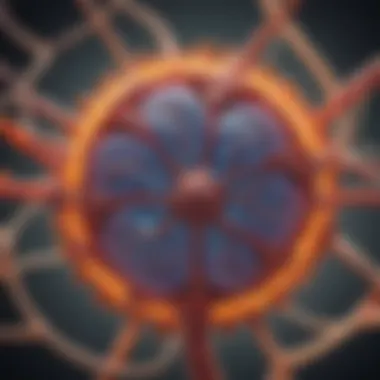Innovative Strategies for Chronic Kidney Disease Management


Intro
Chronic Kidney Disease (CKD) is a progressive condition affecting millions worldwide. It poses a significant challenge not only to those diagnosed but also to healthcare systems. Understanding CKD involves exploring its complexities, which require a deep dive into various interventions and management strategies.
Research Overview
Key Findings
Research shows that CKD often develops silently and can go unnoticed until reaching advanced stages. Key findings indicate that early detection can significantly alter the disease's trajectory. Studies emphasize the importance of lifestyle interventions. These include dietary modifications, regular exercise, and adherence to prescribed medications. Emerging therapies also play a crucial role in managing CKD, but they are still under investigation.
Study Methodology
Most studies examining CKD interventions utilize a combination of observational studies, randomized controlled trials, and meta-analyses. This multifactorial approach allows for robust data collection and analysis, ultimately leading to a better understanding of effective management strategies.
Background and Context
Historical Background
The recognition of kidney diseases has evolved over centuries. Initially, there was limited understanding of CKD. Early records suggest various folk remedies were used. However, in the 20th century, advancements in medical sciences led to improved diagnostic and treatment options. Recognition of risk factors like diabetes and hypertension became crucial in targeting CKD management.
Current Trends in the Field
Today, there is a growing awareness regarding CKD globally. Public health campaigns often focus on prevention. According to recent data, an increasing number of individuals are diagnosed earlier, thanks to improved screening methods. Additionally, technological advancements have led to more personalized treatment strategies and a focus on integrating patient education into care models.
Understanding CKD involves acknowledging the confluence of historical trends and current strategies. The direction of research continues to evolve, and ongoing work is vital to improving patient outcomes.
Preamble to Chronic Kidney Disease
Chronic Kidney Disease (CKD) is not merely a medical condition; it is a growing global health concern that requires immediate and sustained attention. Understanding CKD is crucial for patients and healthcare providers alike. The significance of this topic unfolds as we explore the various dimensions including its definitions, epidemiology, and impacts on individuals and communities. CKD can silently progress over years, leading to severe complications and affecting the quality of life. Thus, grasping its importance is necessary for partnering in a management plan that ultimately improves patient outcomes.
Defining Chronic Kidney Disease
Defining Chronic Kidney Disease involves understanding that it is characterized by a gradual decline in kidney function. Specifically, CKD is defined as a reduction in the glomerular filtration rate (GFR) to less than 60 mL/min/1.73 m² for three months or more, or the presence of markers of kidney damage as indicated by urine tests. Notably, CKD can arise from a variety of causes such as diabetes, hypertension, or glomerulonephritis. Each cause comes with its own implications for treatment and management, highlighting the necessity for precise definitions and clear diagnostic criteria.
Moreover, CKD is classified into five stages, which serve as pivotal indicators in assessing disease progression and determining appropriate interventions. This classification allows healthcare providers to tailor treatments based on the stage and individual needs. Understanding the definition and implications of CKD, thus not only aids in diagnosis but also sets the stage for preventive and therapeutic efforts.
Epidemiology and Risk Factors
The epidemiology of Chronic Kidney Disease reveals its staggering prevalence. Globally, approximately 10% of the population may be suffering from CKD, with millions remaining undiagnosed. Risk factors for CKD are often intertwined with lifestyle choices and existing health conditions. Key risk factors include:
- Diabetes Mellitus: The leading cause of CKD. Elevated blood sugar can damage kidneys over time.
- Hypertension: High blood pressure can harm blood vessels in the kidneys, reducing their ability to filter waste.
- Age: Older adults are at greater risk, as kidney function naturally declines with age.
- Family History: A hereditary component exists, emphasizing the importance of family medical history.
- Obesity: Increased body weight can contribute to diabetes and hypertension, further elevating CKD risk.
- Smoking: Toxins from tobacco can worsen kidney function and affect blood flow.
A comprehensive understanding of these risk factors is vital for early detection and management strategies, positioning CKD as a condition where proactive approaches can lead to better health outcomes. By educating patients about these factors, healthcare providers can encourage behaviors and lifestyle choices that promote kidney health.
Clinical Manifestations of CKD
Understanding the clinical manifestations of Chronic Kidney Disease (CKD) is vital for both patients and healthcare providers. These manifestations can provide crucial insights into the disease progression and potential complications. Awareness of symptoms and their implications can lead to timely interventions, improving patient outcomes and overall quality of life. Recognizing signs early can facilitate targeted management strategies, making it essential to address this aspect of CKD in detail.
Symptoms and Complications
The symptoms of CKD are often subtle at first, which can lead to delayed diagnosis. Common symptoms include fatigue, swelling in the legs, high blood pressure, and changes in urination patterns. As the disease advances, patients may experience more severe symptoms such as nausea, itching, and mental changes. This progression can exacerbate existing health conditions, especially cardiovascular diseases.
Complications arising from CKD can include:
- Cardiovascular Issues: CKD increases the risk of heart attack and stroke, necessitating cardiovascular monitoring.
- Anemia: A reduced erythropoietin production can lead to anemia, making energy levels plummet.
- Bone Disease: Altered calcium and phosphate levels can lead to bone disorders, causing further health issues.
These complications underline the necessity for regular monitoring and management of CKD symptoms, highlighting their importance in treatment planning.
Stages of Kidney Disease


CKD is classified into five stages based on the glomerular filtration rate (GFR). Each stage reflects the severity of kidney damage and guides treatment options:
- Stage 1: Kidney function is normal or slightly impaired (GFR > 90). Mild damage but requires monitoring.
- Stage 2: Mild decrease in GFR (60-89). Patients may start to experience mild symptoms.
- Stage 3: Moderate reduction in GFR (30-59). More noticeable symptoms and complications arise.
- Stage 4: Severe decrease in GFR (15-29). Significant preparation for kidney replacement therapy is necessary.
- Stage 5: Kidney failure (GFR 15). Dialysis or transplant is required for survival.
"Understanding the stages of CKD enables tailored healthcare strategies and improves prognosis."
Early detection and management become imperative as the disease progresses through these stages. Each phase presents unique challenges and necessitates different approaches. As such, recognizing the stages in CKD is not only vital for prognosis but also for crafting individualized treatment plans.
Importance of Early Detection
Early detection of Chronic Kidney Disease (CKD) is crucial for improving patient outcomes and reducing the overall burden of the disease. Identifying CKD in its initial stages allows for timely intervention, which can slow the progression of the disease and potentially prevent kidney failure. This is particularly important given the asymptomatic nature of early-stage CKD, where individuals may not notice any symptoms until the disease has advanced significantly.
The benefits of early detection extend beyond individual health outcomes. They include:
- Cost-Effectiveness: Early identification can lead to less expensive management options compared to treating advanced stages of CKD, which often require dialysis or kidney transplantation.
- Personalized Care Plans: Knowing the stage of CKD allows healthcare professionals to develop tailored management strategies that consider a patient’s overall health and specific risk factors.
- Higher Quality of Life: Patients who receive timely care often report a better quality of life, as they experience fewer complications and maintain better overall health.
However, there are also considerations regarding the importance of early detection. Barriers such as lack of awareness, limited access to healthcare facilities, and insufficient screening protocols can impede timely diagnosis. Addressing these barriers is vital for effective public health strategies aimed at reducing CKD incidence.
"The key to managing Chronic Kidney Disease starts with understanding its early signs and symptoms. With prompt action, patients can maintain kidney function longer and enjoy a better quality of life."
Screening Recommendations
Routine screening for CKD is recommended for individuals at risk, including those with diabetes, hypertension, or a family history of kidney disease. Healthcare providers should adhere to the following guidelines for screening:
- Frequency of Screening: Patients with risk factors should be screened annually, while those with diagnosed CKD may need more frequent assessments.
- At-Risk Populations: Focused screening should target populations such as minority ethnic groups, older adults, and patients with co-existing conditions.
Using standardized screening tools can enhance the detection rates. Tests such as the eGFR (estimated Glomerular Filtration Rate) and urine albumin-to-creatinine ratio are essential in evaluating kidney function.
Laboratory Tests and Biomarkers
Laboratory tests and biomarkers play a vital role in both the diagnosis and management of CKD. Common tests include:
- Serum Creatinine: This test serves as a key indicator of kidney function. Elevated levels may signify a decline in renal performance.
- Urine Tests: These can assess proteinuria and hematuria, both significant markers of kidney damage.
- eGFR Calculation: This calculation helps determine the stage of CKD by estimating kidney filtering capacity based on serum creatinine levels.
Emerging biomarkers are being explored to provide additional insights into kidney health. Some of these include:
- KIM-1 (Kidney Injury Molecule 1): A protein that may indicate tubular injury in the kidneys.
- NGAL (Neutrophil Gelatinase-Associated Lipocalin): This biomarker shows promise for early detection of acute kidney injury.
Incorporating these tests into routine clinical practice can enhance the precision of CKD diagnosis and help guide management decisions. As research continues, the landscape of laboratory testing is likely to evolve, improving the overall detection and management of chronic kidney disease.
Lifestyle Modifications in CKD Management
Lifestyle modifications play a critical role in the effective management of Chronic Kidney Disease (CKD). These changes can impact the progression of the disease and improve patients' overall health. This section addresses the essential elements of lifestyle modifications, focusing on dietary management, physical activity, and weight management strategies. By adopting healthier habits, patients can enhance their quality of life and minimize the potential complications associated with CKD.
Dietary Management
Dietary management is fundamental in the context of CKD. The food choices made by patients greatly influence renal function and general health. Below are key dietary restrictions that can benefit patients with CKD:
Protein Restriction
Protein restriction is significant in CKD management. The kidneys process protein by-products, and excessive protein intake can accelerate kidney damage. This is why moderating protein consumption is a advantageous approach for CKD patients.
A unique feature of protein restriction is the improvement in metabolic outcomes. By limiting protein, the workload on the kidneys decreases, potentially prolonging kidney function. However, this approach requires careful planning. A patient’s protein needs depend on their stage of CKD and other health factors. Thus, too much restriction can lead to malnutrition concerns.
Sodium and Fluid Intake
Monitoring sodium and fluid intake is crucial in CKD management. High sodium levels can lead to hypertension, which is detrimental for kidney health. Managing sodium helps prevent fluid retention, thereby decreasing blood pressure and reducing the burden on the kidneys.
A key characteristic of sodium and fluid management is the emphasis on moderation. Reducing processed foods and being aware of hidden sodium sources significantly impact kidney function. On the downside, strict fluid restrictions can be stressful for some patients, particularly in social situations. Therefore, education is important to help patients make informed dietary choices.
Phosphorus and Potassium Control


Regulating phosphorus and potassium is vital in CKD care. Patients often experience imbalances in these minerals due to kidney dysfunction. High phosphorus can lead to bone disease, while potassium imbalances can pose serious risks to heart health.
The unique feature here involves dietary sources. Many patients must avoid high-phosphorus foods like dairy and certain meats. Similarly, high-potassium foods, such as bananas and tomatoes, need to be monitored. Careful management leads to better health outcomes, but it requires patients to be aware of their diet and, sometimes, make difficult food choices.
Physical Activity Recommendations
Physical activity is an essential component of CKD management. Regular exercise can enhance cardiovascular health, improve mood, and aid in maintaining a healthy weight. Engaging in moderate activities, like brisk walking or cycling, can significantly improve symptoms. However, patients should consult healthcare providers to tailor exercise plans that suit their condition, especially if they have additional health concerns.
Weight Management Strategies
Weight management holds importance for CKD patients. Maintaining a healthy weight can alleviate the stress on the kidneys and promote better overall well-being. Strategies include adopting a balanced diet and establishing a regular exercise routine. Weight loss, when necessary, should be approached with care, ensuring that nutritional needs are met despite calorie restrictions. Education on reading nutrition labels and meal planning can further assist patients in managing their weight wisely.
In summary, lifestyle modifications are not just supporting measures but are integral strategies that can significantly affect the progression and management of CKD. With appropriate dietary choices, physical activity, and weight management, individuals with CKD can navigate their health challenges with a stronger foundation.
Pharmacological Treatments for CKD
Pharmacological treatments for Chronic Kidney Disease (CKD) are critical for managing the condition and improving patients' quality of life. These interventions aim to slow the progression of kidney disease, reduce morbidity, and enhance overall health outcomes. The selection of pharmacological treatments should be individualized based on the patient's condition, comorbidities, and specific needs. Understanding these medications helps patients and healthcare providers align treatment with the patients' health goals.
Antihypertensive Medication
Antihypertensive medications play a vital role in CKD management, predominantly because hypertension is common in these patients. High blood pressure can further deteriorate kidney function. Medications such as ACE inhibitors and angiotensin receptor blockers (ARBs) are frequently prescribed for their renal-protective effects. These agents help control blood pressure while providing additional benefits for kidney health.
Key Points:
- ACE inhibitors lower blood pressure and reduce proteinuria.
- ARBs serve a similar function, offering an alternative for those intolerant to ACE inhibitors.
Regular monitoring of blood pressure and kidney function is necessary to achieve optimal results. Adjustments in dosages may be needed to balance effective hypertension control while minimizing potential side effects.
Control of Diabetic Complications
For patients with diabetes, controlling blood sugar levels is essential to prevent further kidney damage. Medications such as metformin, GLP-1 receptor agonists, and SGLT2 inhibitors contribute not just to blood glucose management, but also have nephroprotective effects.
Benefits of these medications include:
- Reducing the risk of cardiovascular events.
- Slowing the progression of CKD in diabetic patients.
- Improved renal outcomes.
Healthcare providers often tailor diabetes medications to suit the specific needs of CKD patients, emphasizing the importance of managing both blood sugar and kidney health concurrently.
Management of Anemia and Mineral Bone Disorder
Anemia and mineral bone disorders are frequent complications of CKD that complicate treatment significantly. Erythropoiesis-stimulating agents (ESAs) like epoetin alfa are commonly used to correct anemia. Iron supplementation is also crucial for patients to enhance the effectiveness of ESAs.
Additionally, addressing mineral bone disorders often involves using phosphate binders and active vitamin D analogs to manage elevated phosphorus and improve calcium metabolism.
Considerations include:
- Monitoring hemoglobin levels and adjusting ESA doses accordingly.
- Regularly assessing calcium, phosphorus, and parathyroid hormone levels to tailor therapy.
Effective management of anemia and mineral bone disorder not only alleviates symptoms but also improves patients' overall well-being.
Each pharmacological approach should be strategically implemented and monitored continuously. This ensures that CKD patients receive appropriate care, ultimately leading to better clinical outcomes.
Emerging Therapies for Chronic Kidney Disease
Emerging therapies for chronic kidney disease (CKD) are vital to the evolving landscape of treatment and management options. As we advance our understanding of kidney function and pathology, new approaches present enhanced potential to slow disease progression and improve patient outcomes. The focus on innovation is paramount due to the limitations of existing therapies. Patients often face a host of challenges, from managing symptoms to navigating the complexities of treatment regimens. Thus, exploring the latest methodologies could offer a renewed sense of hope for those affected by CKD.
Regenerative Medicine Approaches
Regenerative medicine is a promising frontier in CKD interventions. This approach seeks to restore kidney function by repairing or replacing damaged tissues. Different modalities are being researched, such as stem cell therapy, which involves harvesting stem cells and guiding them to differentiate into kidney cells. Such cells may potentially rejuvenate damaged nephrons, which are crucial functional units of the kidney. In animal studies, stem cell therapy has demonstrated potential to enhance nephron regeneration.
However, while preliminary findings are encouraging, clinical application remains complex. Ethical considerations, especially regarding stem cell sourcing, require careful navigation. Regulatory pathways also present a challenge, as therapies must meet rigorous safety and efficacy standards before becoming widely available. Nevertheless, continued investment in research is crucial. With focused studies and trials, regenerative medicine approaches may provide transformative solutions for CKD management in the future.


Innovations in Dialysis
Dialysis has served as a life-saving treatment for individuals with end-stage kidney disease. However, traditional dialysis methods can be cumbersome and time-consuming, requiring patients to commit several hours multiple times a week. Innovations in dialysis technology aim to address these shortcomings. Home dialysis options, for example, offer patients more autonomy, allowing them to undergo treatment in a more comfortable setting. New portable dialysis machines are also being designed, making it feasible for patients to receive treatment while maintaining an active lifestyle.
Additionally, advancements in bioengineering have led to the development of artificial kidneys. These devices aim to mimic natural kidney functionalities more accurately. Researchers are exploring mechanisms like wearable dialysis systems that can filter blood continuously, reducing the burden of standard dialysis sessions. Such innovations could lead to improved quality of life and health outcomes for many patients.
Clinical Trials and Future Directions
Clinical trials remain the backbone for advancing treatment methods for CKD. Conducting trials facilitates the evaluation of new therapies and their impact on disease progression. Current trials are examining novel drugs that target pathways contributing to kidney damage or inflammation. The results of these studies are critically important. They not only provide insights into possible new medications but also help determine which patient populations might benefit most.
Looking ahead, it is essential to integrate emerging therapies into comprehensive care plans tailored to individual needs. Personalized medicine—taking into account genetic, environmental, and lifestyle factors—holds promise for optimizing therapeutic outcomes. Funding, support from regulatory bodies, and collaboration between researchers, healthcare providers, and patients will be key in realizing the potential of these emerging therapies.
"Emerging therapies could reshape the approach to CKD management, offering hope where traditional methods may fall short."
Patient Education and Support
Patient education and support are pivotal in managing Chronic Kidney Disease (CKD). They empower individuals to understand their condition, make informed decisions, and actively participate in their care. Effective patient education can lead to better health outcomes, adherence to treatment plans, and overall improvement in quality of life. This section delves into the essential resources available for patients, the role of support groups, and the importance of communication between patients and healthcare providers.
Resources for Patients
Access to reliable resources enables patients to grasp intricate details about CKD. There are several reputable sources where patients can find useful information:
- National Kidney Foundation: This organization offers a wealth of educational materials, including guidelines on diet and lifestyle management, which are crucial for CKD patients.
- American Association of Kidney Patients: This is a platform dedicated to providing knowledge and support to those living with kidney disease. They offer pamphlets, webinars, and workshops.
- Online Forums: Websites like reddit.com host communities where patients can share experiences and learn from one another.
Utilizing these resources equips patients to better handle their health, as knowledge fosters empowerment.
Role of Support Groups
Support groups play an influential role in providing emotional and social support. These groups can lead to shared experiences that empathy can enhance. Patients find comfort in knowing they are not alone in their journey. Additionally, support groups offer opportunities to learn about coping strategies and effective self-management in CKD. They can also facilitate discussions on various topics like:
- Dietary adjustments and cooking tips.
- Navigating healthcare systems.
- Personal success stories adapting to CKD.
The benefit of connecting with others in similar situations is invaluable. It cultivates a sense of belonging and motivation to maintain healthy habits and adhere to treatment protocols.
Importance of Patient-Provider Communication
Strong communication between patients and healthcare providers is essential for effective CKD management. Patients should feel comfortable discussing their symptoms, concerns, and preferences openly. Key aspects include:
- Active Listening: Providers must listen to their patients without interruption, acknowledging their concerns.
- Clarification and Feedback: It is crucial that healthcare professionals clarify their recommendations and check for understanding. Patients should feel free to ask questions about their treatment plans.
- Follow-up: Regular follow-ups can ensure that patients receive ongoing support, and adjustments to their care can be made as necessary.
"Open communication reduces confusion and helps formulate effective treatment plans tailored to individual needs."
In summary, patient education, support resources, and communication with providers are integral components in the management of CKD. Collectively, they build a foundation for informed decision-making and improved health outcomes.
Culmination
The topic of conclusion in this article is crucial for synthesizing the information presented and offering a clear perspective on Chronic Kidney Disease (CKD) management. Conclusions provide a framework that helps in reviewing the essential elements discussed throughout the article. This reinforces the main interventions that are available to manage CKD effectively.
In clinical practice, having a clear summary aids healthcare professionals in navigating complex treatment protocols. Additionally, it ensures that patients understand their options, potential outcomes, and necessary lifestyle changes. The key aspects of CKD management involve pharmacological treatments, lifestyle modifications, and support mechanisms that can significantly improve patient quality of life.
It is important for individuals to realize that early detection and personalized treatment plans can lead to better health outcomes. Therefore, concluding this article with a synthesized view encourages a proactive approach for both healthcare providers and patients alike.
Summary of Key Interventions
In reviewing the major interventions discussed, we respond to the challenge of managing CKD with a well-rounded strategy. Key interventions include:
- Lifestyle Modifications: Adjustments in diet, physical activity, and weight management prove essential for preventing CKD progression.
- Pharmacological Treatments: Medications, such as antihypertensives and treatments for anemia, play a pivotal role in controlling complications.
- Emerging Therapies: Innovations in regenerative medicine, genetics, and advanced dialysis options are areas of significant promise in CKD management.
These interventions reinforce the necessity for individualized treatment strategies, tailored to meet the needs of each patient. In summary, comprehensive education and support must accompany these interventions to enhance their effectiveness.
Future Perspectives in CKD Management
Looking ahead, several factors signal advancement in CKD management strategies. Future perspectives include:
- Integrative Care Models: Evolution towards a collaborative care approach, incorporating dietitians, pharmacists, and primary care may yield better outcomes.
- Technological Innovation: Digital health platforms and mobile applications could facilitate regular monitoring and enhance patient engagement.
- Research on Biomarkers: Ongoing research into genetic markers and biomarkers may lead to personalized therapies and proactive management.
- Patient-Centered Care: Engaging patients in their care decisions fosters better adherence to treatment and improves overall wellness.
In essence, the future of CKD management leans heavily on collaboration, innovation, and a patient-centered approach. This evolving landscape promises to enhance the quality of life for those affected by chronic kidney disease.







